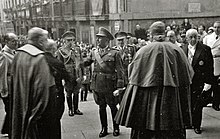
Most measures of religiosity, such as church attendance and affiliation, are positively correlated with the authoritarian personality cluster, which includes submission to authority, conventionality, and intolerance of out-groups.[2][3][4] The correlation is especially strong between religious fundamentalism (defined as belief in an "inerrant set of religious teachings") and authoritarianism, both of which are characterized by low openness to experience, high rigidity, and low cognitive complexity.[2] In particular, authoritarianism "is positively associated with a religion that is conventional, unquestioned, and unreflective".[2][3]
- ^ Casanova, Julian. Unearthing Franco's Legacy: Mass Graves and the Recovery of Historical Memory in Spain. p. 108.
- ^ a b c Wills, Matthew (25 July 2017). "What Links Religion and Authoritarianism?". JSTOR Daily. Retrieved 27 August 2020.
- ^ a b Leak, Gary K.; Randall, Brandy A. (1995). "Clarification of the Link between Right-Wing Authoritarianism and Religiousness: The Role of Religious Maturity". Journal for the Scientific Study of Religion. 34 (2): 245–252. doi:10.2307/1386769. ISSN 0021-8294. JSTOR 1386769.
- ^ Wink, Paul; Dillon, Michele; Prettyman, Adrienne (2007). "Religiousness, Spiritual Seeking, and Authoritarianism: Findings from a Longitudinal Study". Journal for the Scientific Study of Religion. 46 (3): 321–335. doi:10.1111/j.1468-5906.2007.00361.x. ISSN 0021-8294. JSTOR 4621983.